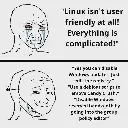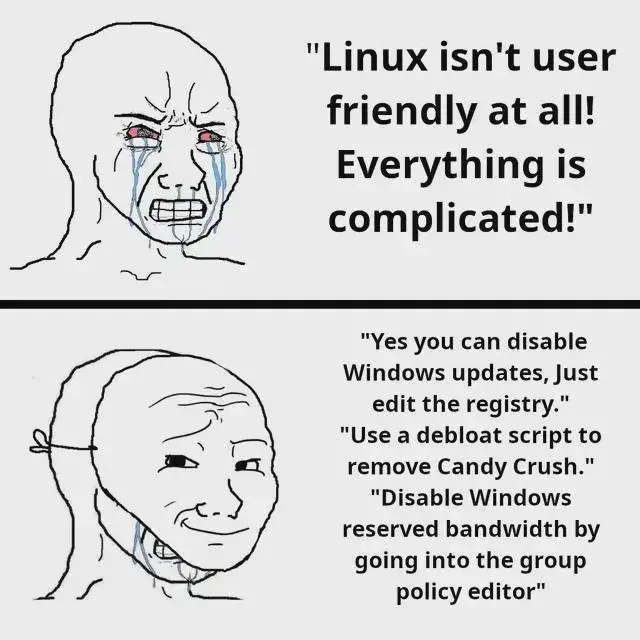That's LTT in the bottom
That's LTT in the bottom


That's LTT in the bottom


You're viewing a single thread.
100% agreed. Once you disable all the unnecessary stuff Windows comes with you'll be left with a stable system that is compatible with everything from professional to hobbyist software. Meanwhile under Linux you'll spend all your days on getting a basic system to run properly (for some distros) or trying Wine, virtualization and other subpar hacks to get any kind productivity and ability to cooperate with others. :)
a stable system
Until next update, where they may just blacklist your CPU just because
Or an update where they delete all your files again.
2018: https://www.windowscentral.com/windows-10-october-2018-update-file-deletion-bug-story 2020: https://www.howtogeek.com/658194/windows-10s-new-update-is-deleting-peoples-files-again/
These both happened to me. I was already looking into switching to Linux in 2020, and the last update did it for me. Have been only been using Linux at home ever since.
Just wait for the next version of insert-non-debian-linux-distro and you won't be able to boot after trying an update. :)
I find it very interesting that I always see a lot of people complaining about those kinds of updates breaking Windows all the time. In my experience I've only seen it happening with old ass , cheap hardware computers. Never had issues myself with mid range and hardware from reputable brands. If you've a computer from Aliexpress or some Chinese brand, oh well, you get what you payed for.
insert-non-debian-linux-distro and you won't be able to boot after trying an update. :)
Sure buddy, I'll take your unsourced claim as an equivalent to my sourced one! /s
In my experience I've only seen it happening with old ass , cheap hardware computers.
Do you know what anecdotal evidence is?
This is some weird tribal emotional stuff.
I run both on the same machine in VMs, had this fedora install since 2019 and kept up with the version upgrades every year. Its just worked without issue during that whole period. I use office in the web app. Windows is there to run cad/cam software. It feels more gross with all the candy crush etc that you have to remove, but it works fine to run the software I need it for.
What's with all the hyperbole above? Did someone hurt you?
I run both on the same machine in VMs
And now you suddenly have to manage two operating systems with all their quirks. Nice!
Going full Linux desktop kinda adds the same pains of going macOS but 10x. Once you open the virtualization door your productivity suffers greatly, your CPU/RAM requirements are higher and suddenly you’ve to deal with issues in two operating systems instead of just one. And… let’s face it, nothing with GPU acceleration will ever run decently unless big companies start fixing things - GPU passthroughs and getting video back into the main system are a pain and add delays.
Why not just give in an manage A SINGLE yet productive OS that is widely supported by every vender and tool you might need? To Microsoft's credit they made WSL and Windows Terminal very well and it's way easier to run the 1 or 2 Linux-only applications on those than the other way around.
Err OK. I passthrough a card to each, switch with KVM. Its like having 2 native machines. According to you I have loads of issues, I guess I just haven't found them yet? What should I be giving in to?
This is really weird,
ps, I sometimes game on either system, still can't tell any performance difference from when it was bare metal. I guess I could be super lucky considering all those issues I should be having. Or maybe things aren't quite as dramatic as you've portrayed them
How are you getting your video back into the main system? Some kind of remote desktop protocol? That adds delay. Unless your VM is attached to e dedicated screen you'll have issues there.
The host is headless, no video output. The 2 VMs have a GPU passed directly through vfio, so there is no additional delay. Both GPUs connect to the same 2 monitors and USB by a KVM, so its one button press to flip between systems. Though I often run the cad software over RDP, as a little extra latency when using that doesn't bother me.
There you go.
This highly dependent on what you do, do you do graphics or video editing then you are right, do you do non-Windows specific coding? Its the exact opposite.
do you do graphics or video editing then you are right
Not just that, same for every advanced MS Office product, any other enterprise desktop MS application, architecture, a lot of engineers...
do you do non-Windows specific coding? Its the exact opposite.
Jetbrains is available for all platforms and runs equally good on all of them.
Nah, Wine runs most XP-times software better, Windows 10+ sometimes not at all. Some people do hacks like running wine in WSL because of this.
There goes your compatibility. Not to mention that Windows is probably the most incompatible OS (to the rest) in wide use (filesystem, non-POSIX, drivers, etc.)
You're full of shit. Wine still fails at basic Win32 API calls available since Windows 95 and most thing that fail under modern Windows versions are usually GPU related tasks like games and the fact that you don't have specific DirectX or DirectPlay features available on your modern OS and/or GPU and those cases there's dgVoodoo2.
Do you really want to talk about compatibility? Just try to install MS Office 2003 and Photoshop 6 under Windows 11 - you'll fine that both will work just fine without hacks.
They have app specific "hacks" in place for old popular software. Like Winamp and the ones you mentioned.
I won't consider using dozens of random debloating scripts made by reverse engineering Windows binary files a stable experience.
Also the second part is clearly frustration of running Windows-only software on Linux. Like, just look at installing Linux vs Windows experience. On Windows there is no live ISO, super outdated look, terrible user unfriendly partitioning section and after that they don't even show you a nice welcoming overview of the system like Gnome or KDE now have.
I won’t consider using dozens of random debloating scripts made by reverse engineering Windows binary files a stable experience.
The thing is that this isn't correct.
Windows' bloat/spyware can be disabled via group policy and it works really well because it was designed to allow it. There are countess companies and government agencies that force Microsoft to have group policy settings to disable the "spyware" otherwise they couldn't use it.
Microsoft provides very detailed documentation into the bloat that you can follow to disable what you don't want. https://learn.microsoft.com/en-us/windows/privacy/manage-connections-from-windows-operating-system-components-to-microsoft-services. Those "dozens of random debloating scripts" are usually just following that guide, not much else.
I'm not saying Windows is good, I'm just saying it delivers and for the hassle that it takes to run Windows-only software (that most people require) under Linux, most people might be better off by spending a quarter of that time debloating Windows.